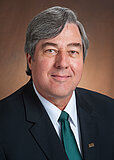
Dr. David R. Steward, PE, PG, F.ASCE
Walter B. Booth Distinguished Professor
Department Chair in Civil and Environmental Engineering
Office: CIE 201A
Phone: (701) 231-6004
Email: david.steward@ndsu.edu
Personal Webpage: https://www.ndsu.edu/faculty/steward/david_r_steward/
Education
- Ph.D., Civil Engineering, University of Minnesota, Minneapolis, MN
- M.S., Civil Engineering, University of Minnesota, Minneapolis, MN
- M.S., Mathematics, University of Minnesota, Minneapolis, MN
- B.S., Civil Engineering, University of Minnesota, Minneapolis, MN
Career Objectives
- To study grand challenge problems in water resources, and foster innovative solutions to groundwater depletion.
- To mentor understanding of groundwater's role in society and ecosystems, working within diverse teams of engineering students and faculty members.
- To engage in outreach, and disseminate mathematical, computational and experimental methods.
Professional Experience
Prof. Steward completed a BSCE degree and then worked for six years as a system programmer at Unisys, in the areas of B1 security testing and design of executive software for IP/memory hardware fault control for mainframe computers. He returned to the University of Minnesota to pursue studies of groundwater flow and engineering mathematics, and remained at the University of Minnesota as a post-doctoral research associate before moving to the University of Maine as a post-doc in coastal engineering. Professor Steward joined Kansas State University in the department of civil engineering, where he led interdisciplinary teams to study water resources, and taught courses in groundwater flow and analysis, hydraulics, engineering mathematics, and water-and-society. He joined North Dakota State University as the chair of the Department of Civil and Environmental Engineering, and is now also chair of the Department of Construction Management and Engineering, where he leads an outstanding team of faculty and staff towards preparing the next generation of engineers for the challenges they will face in: designing infrastructure for society, and designing solutions to promote human and environmental health.
Research
Professor Steward leads a research program addressing the grand challenge of water resources for society through two complementary approaches. One research focus is interdisciplinary water resources studies. Professor Steward has collaborated with colleagues across agriculture, architecture, arts & sciences, education, engineering, and veterinary medicine. These endeavors have been funded by over $18 million in research grants, where Dr. Steward has served as lead or co-principal investigator from funding agencies such as NSF, USDA, US EPA, and many other local and international agencies and consulting firms. The second research focus is development of advanced methods of mathematical analysis for engineering problems using the Analytic Element Method. The AEM has emerged over 25 years of groundwater studies, and enables nearly exact solutions to study complicated interactions of flow through aquifer features. Discovery of the critical factors that control water resources systems have been identified through these collective interactions, and results have been communicated with a wide range of water stakeholders.
Recently published: Analytic Element Method: Complex Interactions of Boundaries and Interfaces, David R. Steward, Oxford University Press, 2020.
Academic Highlights
Dr. Steward's career goals focus on establishing large multifaceted teams to successfully address engineering grand challenges. He engaged, facilitated and led collaborations of faculty members, staff and students: to conduct research and education, to develop large funded grants and administer departmental resources, to meet with collaborators and stakeholders, and to disseminate findings. For example, as PI on the $1.5M NSF grant from the Dynamics of Coupled Natural and Human Systems in the crosscutting Biocomplexity in the Environment priority area, the senior personnel team consisted of faculty members in: agricultural economics, agronomy, civil engineering, computer and information sciences, landscape architecture, political science, and sociology. An example of synergistic activities is found in the team's 2013 paper in Proceedings of the National Academy of Sciences, which quantified the role of groundwater depletion on agricultural production. Advancements in engineering and interdisciplinary education include classroom-level through university-level curriculum development, for example as co-PI of NSF's National Science Foundation Research Trainee $3M grant to study the Food/Energy/Water (FEWS) nexus. Outreach and engagement occurred through hundreds of interactions with stakeholders, communities, school groups, agencies and organizations. Dr. Steward is a Fellow at ASCE, and is licensed as a Professional Engineer (license number 27726, North Dakota and 54874, Minnesota) and a Professional Geoscientist (license 3957, Texas).


